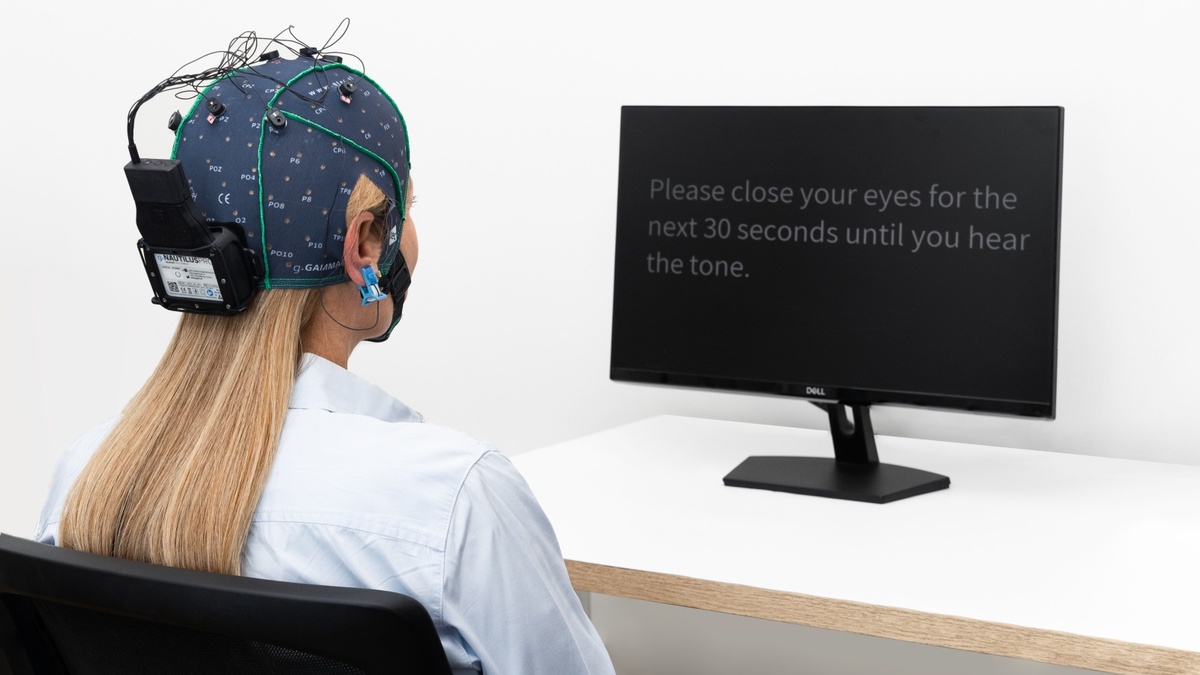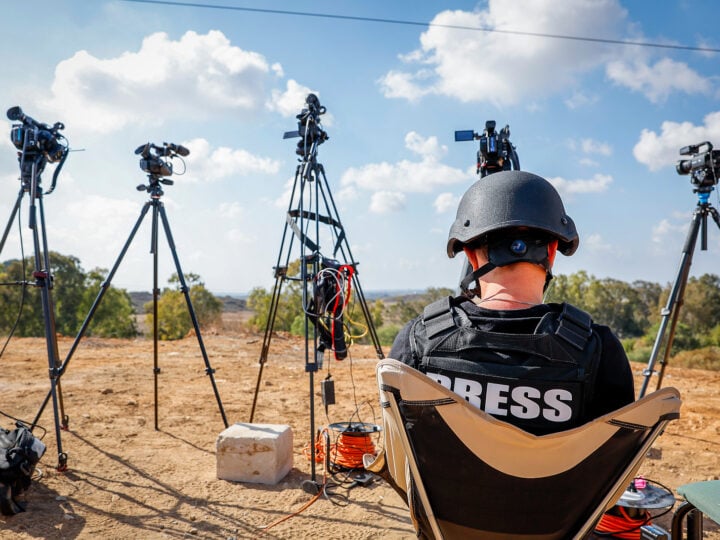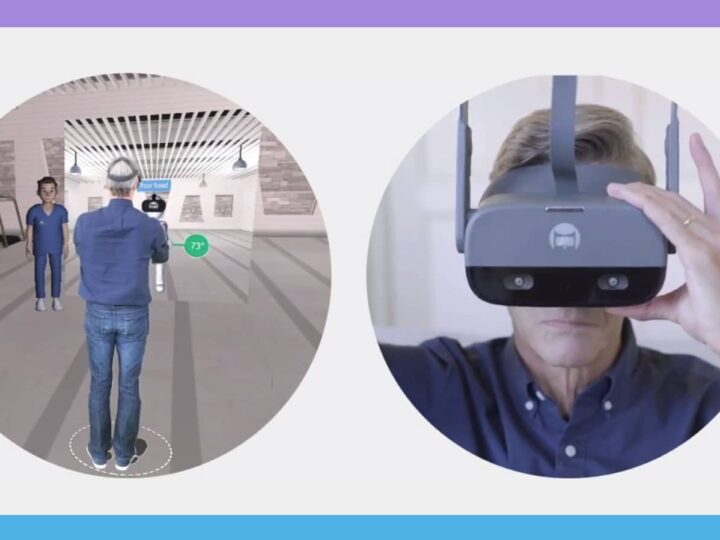June is Post-Traumatic Stress Disorder Awareness Month, a fitting time for the soft launch in the United States of Prism for PTSD, the first noninvasive self-neuromodulation digital therapy for treating this common mental-health issue.
According to the US National Institutes of Health, PTSD can develop after someone experiences or witnesses a life-threatening event such as combat, a natural disaster, a car accident, or sexual assault. Symptoms may include nightmares, uncontrollable thoughts about the event, flashbacks and avoidance of the distressing memories.
Meant as an adjunct to psychotherapy or pharmacotherapy, Prism uses an EEG cap that is paired with interactive audiovisuals to train patients in how to lower the biomarker associated with PTSD, thus regaining control over their brain’s emotional regulation system.
Prism for PTSD was developed at Haifa-based GrayMatters Health based on patented technology from Dr. Talma Hendler, a professor of neuroscience and psychiatry at Tel Aviv University and director of the Sagol Brain Institute at Tel Aviv Sourasky Medical Center.
Hendler used advanced statistical models to fuse EEG and fMRI data of specific brain regions, creating an EEG-fMRI Pattern (EFP) biomarker of brain regions associated with mental disorders. Prism for PTSD uses an amygdala-derived-EFP biomarker.
In March, the device received US Food and Drug Administration clearance for marketing.
Get the avatars to sit down
Under the supervision of their mental healthcare practitioner, patients undergo 15 half-hour sessions with Prism for PTSD every two months and then receive booster sessions as needed to reinforce the training.
What they see on the screen is a bunch of agitated avatars (representing the amygdala-derived-EFP biomarker for PTSD) standing at a reception desk in a clinic. The goal is to self-neuromodulate to get the avatars to sit down, which each patient accomplishes in his or her own way.
“For one it might be a childhood memory, for another it might be a song, for another it might be counting to 15,” explains GrayMatters cofounder and CEO Oded Kraft. “This personalized, patient-generated element is unique.”
Learning how to lower the avatars creates actual change in the brain, he says.
“We’re training the patient to better regulate certain activities of the brain. It’s a skill that, with practice, people can turn into a habit. Patients typically understand what to do in the first two sessions and then the remaining sessions are for practicing.”
The professional decides how to integrate this into a patient’s treatment regimen.
“We’ve seen in our studies that when Prism for PTSD is added, a considerable number of patients experience significant clinical improvement in their care, with mild and transitory side effects like nausea and fatigue that fade quickly,” says Kraft.
Invented in Tel Aviv
“It all started about 15 years ago when Dr. Hendler, our chief medical scientist, researched the mechanism and the challenges of limited treatment effect,” says Kraft, who noted that Hendler’s late husband, a doctor and movie director, suffered from PTSD.
Throughout 2016, Kraft and eventual cofounders Rani Cohen and Shai Attia met with Hendler to determine how her concept could be commercialized for treatment or diagnostic purposes.
“We were fascinated with her work and believed this technology could lead to a paradigm shift in psychiatry,” Kraft tells ISRAEL21c.
They raised a seed round shortly before the Covid pandemic and altogether have raised $13 million from US and Japanese investors, the European Innovation Council, the BIRD Foundation and the Israel Innovation Authority.
“Prof. Hendler did a few studies, one funded by the US Department of Defense, and we identified a gap in the market: existing therapeutic modalities were working for many but not for all, with significant side effects. We believed in our ability to fill that gap.”
High rate of symptom improvement
By the end of 2020, GrayMatters had installed its first clinical version of Prism for PTSD at Rambam Health Care Campus in Haifa and at a New York University Langone Health facility in New York City.
Clinical studies continued into mid-2022 and expanded to other centers in Israel and in the United States, some also evaluating the technology for future use in treating additional disorders such as depression and ADHD.

FDA clearance was based on successful results noted in 79 patients with chronic PTSD, at least one year since experiencing trauma.
“The study leading to Prism for PTSD’s 510(k) FDA clearance resulted in high-quality clinical data that exemplifies the efficacy and safety of this innovative device,” said Prof. Charlie Marmar, principal investigator of the NYU Langone trial.
“Results demonstrated a high rate of symptom improvement, a low rate of adverse event and a low attrition rate. I am encouraged that Prism, as an adjunctive therapy, will significantly benefit patients with PTSD and allow clinics to offer more options and better outcomes.”
Continuing development
GrayMatters is now expanding its US team and “has initiated a largescale PTSD study with some of the top mental-health institutions in Germany, through a European Union grant,” said cofounder Cohen, executive chairman of GrayMatters Health.
“Additionally, we are furthering our collaboration in Japan with our investors and partners at Otsuka Medical Devices.”
Kraft said the company plans to expand clinical development to evaluate Prism for major depressive disorder, attention deficit hyperactivity disorder, general anxiety disorder and borderline personality disorder.
“Looking ahead, the company also plans to use deidentified data collected throughout Prism treatments to develop treatment predictors, patient management tools and treatment personalization,” he says.
For more information, click here.

















